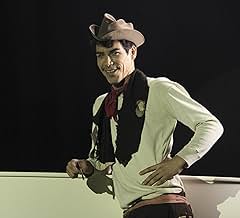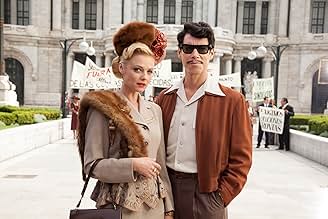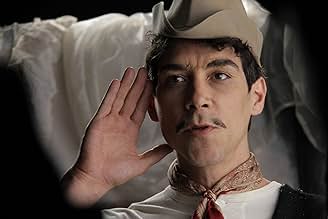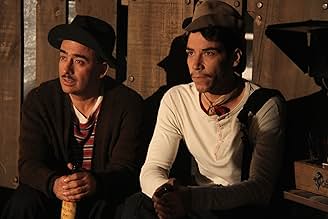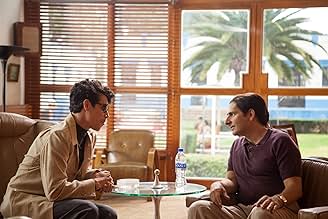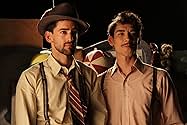IMDb RATING
6.6/10
4.3K
YOUR RATING
The untold story of Mexico's greatest and most beloved comedy film star of all time, from his humble origins on the small stage to the bright lights of Hollywood.The untold story of Mexico's greatest and most beloved comedy film star of all time, from his humble origins on the small stage to the bright lights of Hollywood.The untold story of Mexico's greatest and most beloved comedy film star of all time, from his humble origins on the small stage to the bright lights of Hollywood.
- Director
- Writers
- Stars
- Awards
- 30 wins & 11 nominations total
Arantza Muñoz
- Bailarina
- (as Aranzta Muñoz)
Armando Vega Gil
- Músico Salón
- (as Armando Vega-Gil)
- Director
- Writers
- All cast & crew
- Production, box office & more at IMDbPro
Featured reviews
Cantinflas (2014) should have been a clever little gem about a piece of forgotten film history but ends up being a solidly boring mish-mesh of a film that did little justice to its subject matter. In it Cantinflas aka Mario Moreno (Oscar Jaenada) works his way up from a minor vaudeville player on the streets of Mexico City to one of the most beloved Mexican actor/comedians of all time.
He does so while a second, mostly English tale unfolds. Michael Todd (Michael Imperioli) a wily producer at United Artists is trying to cobble together the 1956 theatrical version of Around the World in 80 Days. He boasts to the studio exec that he can convince over forty international film stars to be in the film but in reality he barely has Elizabeth Taylor on the hook. In an attempt to make the film salvageable he asks the ever-popular Cantinflas to make a cameo appearance.
Despite polished period detail and some worthwhile performances, Cantinflas feels cheap and more than a bit off. The cinematography colludes into a mix of flat browns and grays and everyone seems to be spotted by florescent lights. One cannot help but wonder if this story was given to a more mature director we'd be able to see and enjoy the vibrant colors of Mexico and the luster of old Hollywood.
The film is also betrayed by a script that fails to staple the important moments or rather the two largest threads into a story of urgency. The turbulent labor politics of Moreno's time get the same compromised treatment as his early roving theatre career. His height of popularity is as deflated as the 80 Days subplot. It's as if the editors lost a few key scenes on the cutting room floor and pasted half-shot scenes together hoping the audience wouldn't notice.
There's one nearly-poignant scene where Cantinflas, in a "success is ruination"-type stupor sees a note of encouragement by none other than Charlie Chaplin. Again I say near-poignant because up until that moment we never knew Chaplin's opinion was important to Cantinflas. Goaded by the letter, once Cantinflas agrees to do Around the World in 80 Days it leaves him without catharsis or character change. His wife seemed to think fame was going to his head so appearing in the film he's most internationally recognized for wouldn't have solved that dispute; yet it did.
Cantinflas attempts to create a stereotypical biographical film out of a figure that, given the events of the film, deserved better. At best this film deserves to be on cable and given a Hallmark type release, not a theatrical one. Maybe in the decades to come people will honor his contribution to his nation's cinema with a movie that immortalizes the man properly. Now that would be the rub.
http://www.theyservepopcorninhell.blogspot.com
He does so while a second, mostly English tale unfolds. Michael Todd (Michael Imperioli) a wily producer at United Artists is trying to cobble together the 1956 theatrical version of Around the World in 80 Days. He boasts to the studio exec that he can convince over forty international film stars to be in the film but in reality he barely has Elizabeth Taylor on the hook. In an attempt to make the film salvageable he asks the ever-popular Cantinflas to make a cameo appearance.
Despite polished period detail and some worthwhile performances, Cantinflas feels cheap and more than a bit off. The cinematography colludes into a mix of flat browns and grays and everyone seems to be spotted by florescent lights. One cannot help but wonder if this story was given to a more mature director we'd be able to see and enjoy the vibrant colors of Mexico and the luster of old Hollywood.
The film is also betrayed by a script that fails to staple the important moments or rather the two largest threads into a story of urgency. The turbulent labor politics of Moreno's time get the same compromised treatment as his early roving theatre career. His height of popularity is as deflated as the 80 Days subplot. It's as if the editors lost a few key scenes on the cutting room floor and pasted half-shot scenes together hoping the audience wouldn't notice.
There's one nearly-poignant scene where Cantinflas, in a "success is ruination"-type stupor sees a note of encouragement by none other than Charlie Chaplin. Again I say near-poignant because up until that moment we never knew Chaplin's opinion was important to Cantinflas. Goaded by the letter, once Cantinflas agrees to do Around the World in 80 Days it leaves him without catharsis or character change. His wife seemed to think fame was going to his head so appearing in the film he's most internationally recognized for wouldn't have solved that dispute; yet it did.
Cantinflas attempts to create a stereotypical biographical film out of a figure that, given the events of the film, deserved better. At best this film deserves to be on cable and given a Hallmark type release, not a theatrical one. Maybe in the decades to come people will honor his contribution to his nation's cinema with a movie that immortalizes the man properly. Now that would be the rub.
http://www.theyservepopcorninhell.blogspot.com
As much as I love learning about the history of Hollywood, there can be something pretentious about the Hollywood biopic. The story of a great creative mind taking Hollywood by storm is one that's been told too many times and easily falls into repetition. Aside from that, there's always the sneaking suspicion that the screenwriter or director is co-opting his subject's story to wrestle with his own greatness.
"Catinflas" intrigued me enough at the start that I decided to throw caution to the wind hoping the plot wouldn't veer into cliché. I enjoyed seeing the trial and error process over how Catinflas discovered his true calling, I thought the setting was unique (especially the unforgiving Mexican stage where heckling is the norm) and the actor who played Catinflas had a magnetic working-man kind of presence.
The decision to intercut the story of Mario "Catinflas" Morelli's ascension to fame over the years and the trials and tribulation "Around the World in 80 Days" producer Michael Todd to get his film made, also had potential except for the fact Michael Todd seemed like a rather flat character (not to take anything away from Imperioli's performance), and while I enjoyed "Around the World in 80 Days" as a kid, I'm not sure if there's anything to celebrate in Todd's methodology of putting every actor he could find in the film.
The storyline itself is one I've seen a hundred times before, so the film was largely on the shoulders of Oscar Jaenada and to the degree he could, Jaenada did an extraordinary job. If only he had slightly better material to work with.
"Catinflas" intrigued me enough at the start that I decided to throw caution to the wind hoping the plot wouldn't veer into cliché. I enjoyed seeing the trial and error process over how Catinflas discovered his true calling, I thought the setting was unique (especially the unforgiving Mexican stage where heckling is the norm) and the actor who played Catinflas had a magnetic working-man kind of presence.
The decision to intercut the story of Mario "Catinflas" Morelli's ascension to fame over the years and the trials and tribulation "Around the World in 80 Days" producer Michael Todd to get his film made, also had potential except for the fact Michael Todd seemed like a rather flat character (not to take anything away from Imperioli's performance), and while I enjoyed "Around the World in 80 Days" as a kid, I'm not sure if there's anything to celebrate in Todd's methodology of putting every actor he could find in the film.
The storyline itself is one I've seen a hundred times before, so the film was largely on the shoulders of Oscar Jaenada and to the degree he could, Jaenada did an extraordinary job. If only he had slightly better material to work with.
10tshi1967
I simply enjoyed this film, I grew up watching his movies with my parents at our hometown drive-theater. Even at young age, I truly appreciated his sense of humor and comedy approach to many delicate subjects. Oscar Jaenada (though many of my peers don't agree) did a beautiful performance! This film was long over do! Congrats to all who put this project together and showed us the the person behind the movies. I have to add, my parents were truly moved by the performance and his early beginnings, a story they thought they knew. A true homage to Mario Moreno and his legacy. Looking forward to more performance from Oscar Jaenada.
Unless you are familiar with the Mexican phenomenon known as Cantinflas, before you watch this new bio-pic, you might just want to see a few of these films first so that you can appreciate their wonderful style and charm. They also might help you to understand why Charlie Chaplin raved about the man who created this character and referred to him as 'the world's greatest comedian' as well as why they've chosen to make a film about his life.
Unfortunately, "Cantinflas" is NOT the perfect film about Mario Moreno's life and career in films. It seems to spend too much energy focusing on his performance in the Hollywood film "Around the World in 80 Days" and not nearly enough on his Mexican movies--which are clearly his best. While his role in "Around the World" did help to bring him to the attention of the American public, his career in Hollywood films would later turn out to be a flop--something that the film not only fails to mention but it strongly implies that his efforts in American cinema were very successful. Likewise, the film tends to whitewash Moreno's personal life at times and fails to show just how beloved the man was in his native land. Despite these flaws, the movie is still well worth seeing. Óscar Jaenada does a lovely job impersonating the late actor and the film is technically a very well made film. It also does a good job in showing the path by which Moreno learned his craft and perfected his Cantinflas character--all things that fans of these films should appreciate and enjoy. It also leaves you wanting to see more--something I'd strongly recommend. You might want to try a few of his later films, such as "The Little Priest", "El Bolero de Raquel", "The Illiterate One" or "Su Exelencia", as they are excellent and, more importantly, are widely available on DVD since they were released by Columbia Pictures, unlike his earlier films.
Incidentally, "Cantinflas" is the official submission for Mexico for the Best Foreign Language Oscar. We'll soon see if it's among the few selected nominees for this award.
Unfortunately, "Cantinflas" is NOT the perfect film about Mario Moreno's life and career in films. It seems to spend too much energy focusing on his performance in the Hollywood film "Around the World in 80 Days" and not nearly enough on his Mexican movies--which are clearly his best. While his role in "Around the World" did help to bring him to the attention of the American public, his career in Hollywood films would later turn out to be a flop--something that the film not only fails to mention but it strongly implies that his efforts in American cinema were very successful. Likewise, the film tends to whitewash Moreno's personal life at times and fails to show just how beloved the man was in his native land. Despite these flaws, the movie is still well worth seeing. Óscar Jaenada does a lovely job impersonating the late actor and the film is technically a very well made film. It also does a good job in showing the path by which Moreno learned his craft and perfected his Cantinflas character--all things that fans of these films should appreciate and enjoy. It also leaves you wanting to see more--something I'd strongly recommend. You might want to try a few of his later films, such as "The Little Priest", "El Bolero de Raquel", "The Illiterate One" or "Su Exelencia", as they are excellent and, more importantly, are widely available on DVD since they were released by Columbia Pictures, unlike his earlier films.
Incidentally, "Cantinflas" is the official submission for Mexico for the Best Foreign Language Oscar. We'll soon see if it's among the few selected nominees for this award.
I've seen the movie "Cantinflas" directed by Sebastian del Amo, and I am convinced that this is "the film that every Mexican must-see". This is biopic is the story of Mexico's greatest and most beloved comedy film star of all time, Mario Moreno "Cantinflas". The film follows him from his humble beginnings on the small stage to the bright lights of Hollywood.
On one side you discover the man: Mario Moreno who expressed his values through his Cantinflas character on films and stage. Cantinflas gives voice to social issues: on his films he would protest against injustice, keeping his cool being sincere, generous, honest and optimistic. Cantinflas never resorted to vulgarity, nor to profanity, insults or violence to make us laugh, and his unique speech style (cantinflear) reflects the demagogic rhetoric we hear from politicians. We all recognize on Mario Moreno "Cantinflas" a Mexican hero who overcame poverty and lack of formal education to become an artist and humanist, recognized worldwide.
On the other hand, there is the film where actor Oscar Jaenada does a masterful "incarnation" of Mario Moreno Cantinflas. Thanks to Oscar's credibility and this film's quality production, more people attended movie theaters to watch the movie and a new generations will better understand Cantinflas legacy and values.
In addition, the performances of other actors like Ilse Salas, Barbara Mori, Gabriela de la Garza and Luis Gerardo Méndez, to name a few, were preceded by months of preparation and are really a tribute to the characters they play. Original music by Aleks Syntek. Screen play by Edui Tijerina, and excellent production of entrepreneurs Vidal Garza Cantú, Adolfo Franco, Alejandro Barron, and Mario Moreno Ivanova. Thus, "Cantinflas" brings to life Mexico's hero, so this is a most- see film for everyone in Mexico, and elsewhere.
On one side you discover the man: Mario Moreno who expressed his values through his Cantinflas character on films and stage. Cantinflas gives voice to social issues: on his films he would protest against injustice, keeping his cool being sincere, generous, honest and optimistic. Cantinflas never resorted to vulgarity, nor to profanity, insults or violence to make us laugh, and his unique speech style (cantinflear) reflects the demagogic rhetoric we hear from politicians. We all recognize on Mario Moreno "Cantinflas" a Mexican hero who overcame poverty and lack of formal education to become an artist and humanist, recognized worldwide.
On the other hand, there is the film where actor Oscar Jaenada does a masterful "incarnation" of Mario Moreno Cantinflas. Thanks to Oscar's credibility and this film's quality production, more people attended movie theaters to watch the movie and a new generations will better understand Cantinflas legacy and values.
In addition, the performances of other actors like Ilse Salas, Barbara Mori, Gabriela de la Garza and Luis Gerardo Méndez, to name a few, were preceded by months of preparation and are really a tribute to the characters they play. Original music by Aleks Syntek. Screen play by Edui Tijerina, and excellent production of entrepreneurs Vidal Garza Cantú, Adolfo Franco, Alejandro Barron, and Mario Moreno Ivanova. Thus, "Cantinflas" brings to life Mexico's hero, so this is a most- see film for everyone in Mexico, and elsewhere.
Did you know
- TriviaOfficial submission of Mexico to the best foreign language film category of the 87th Academy Awards 2015.
- GoofsThe scene of shooting "Ahí está el detalle" (1940) begins with a title card indicating that filming takes place at Churubusco Studios. Churubusco facilities weren't opened until 1945. In fact, filming took place at CLASA Studios.
- Crazy creditsWhile the credits role one of the most famous scenes of the film El bolero de Raquel is recreated by the actors in the film.
- ConnectionsFeatures Le Voyage dans la Lune (1902)
- SoundtracksScore 01/ Original Soundtrack - Cantinflas: Música Original De La Película
Composed by Roque Baños (as Roque Baños López)
Universal / Universal Music Latino / Vene
- How long is Cantinflas?Powered by Alexa
Details
- Release date
- Country of origin
- Languages
- Also known as
- 캔틴플라스
- Filming locations
- Teatro de la Ciudad, Mexico City, Mexico(Where Cantinflas and his friends go to a show early in the film.)
- Production company
- See more company credits at IMDbPro
Box office
- Budget
- $3,000,000 (estimated)
- Gross US & Canada
- $6,382,924
- Opening weekend US & Canada
- $2,661,253
- Aug 31, 2014
- Gross worldwide
- $17,998,703
- Runtime
- 1h 42m(102 min)
- Color
Contribute to this page
Suggest an edit or add missing content

![Watch Tráiler [OV]](https://m.media-amazon.com/images/M/MV5BMDJhMDMxOTYtODA3MS00YTQzLWEyODctM2M1Y2FiZjI5YjBkXkEyXkFqcGdeQXRodW1ibmFpbC1pbml0aWFsaXplcg@@._V1_QL75_UX500_CR0)





